Me, my bike and I : discovering Moldova differently
A guest article about exploring Moldova
It’s a late Saturday afternoon, in a remote Moldovan village. My host’s name is Ion, a 50-year-old man with a face worn by life. The blue walls of his kitchen are crumbling, and water doesn’t seem to be running from his tap, but his little red stained glasses are filled with homemade wine. It is Ion’s birthday today, a good reason to toast! For the occasion, his table is garnished with mamaliga, a loaf of bread, a piece of sliced bacon and vegetables. But it is only me and Ion in the house, and the least I can say is that we’re struggling to communicate together. I arrived in Moldova a couple of weeks ago, from France, and my Romanian is limited to a timid “buna ziua” (good day), and eventually “multumesc” (thank you). You might therefore, and rightly so, be wondering how I ended up in this situation!
My name is Jules, I’m a 23-year-old French student studying European affairs, who came to Moldova as part of a gap year to understand the country’s EU integration process better. Before leaving, I spent weeks hunting around bookshops in Paris for travel guides, to no avail. Moldova is indeed a rather unknown country to Western Europe. So, despite my huge motivation to come to Moldova, it very much felt like a jump into the unknown. But armed with my curiosity, my bike and my camera, I decided to welcome this new experience with open arms, and to set off, almost every weekend, on the roads of the Moldovan countryside to explore the hidden gems of this wonderful country.
It was on one of these occasions that I met Ion. He hailed me from the side of the road as I was passing through his village. I stopped, we talked. When he discovered that I was French, he started to sing the song he was taught in French classes at school, about pencils, classrooms and teachers. How could I refuse his invitation for a glass of wine! We walked through the magnificent green doors of his house, so characteristic of Moldovan villages, and spent the rest of the afternoon together. We didn’t understand each other but enjoyed our time together. Before I left, he asked me to write down my name and address in Paris in his rusty notebook. I did so, under the contact details of an Italian guy that has also ended up in Ion’s house sometime before. This was my first experience of Moldovan hospitality.


Initially, I didn’t find the Moldovan countryside so hospitable. My first ride had been marred by an unpleasant encounter with a pack of stray dogs chasing me around every corner. In addition to the stress and fatigue induced by these sprints, I was also upset by the prospect of not being able to cycle around Moldova. Undaunted, I set out in search of a solution, which I found in the form of a small grey plastic box: my ultra-sound remote control which keeps stray dogs away from me. This little magic box opened the doors to a little paradise for cyclists: the Moldovan countryside. A kingdom where the steepness of the hills is balanced by the unspoiled roadside vegetation. Where I get hypnotized by the endless lines of vineyards through which I coast down. Where the unfenced cattle on the side of the road makes me forget about the unpredictability of the road surfaces. Where, finally, the splendid sunsets that bathe the landscape into a warm and soft yellow light that always seem too short.

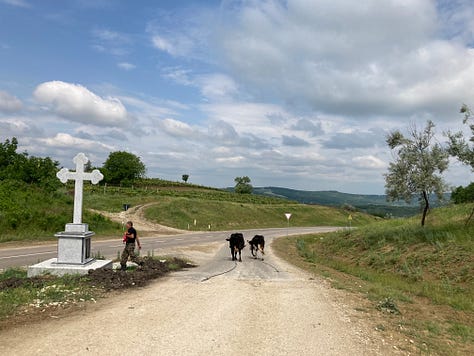

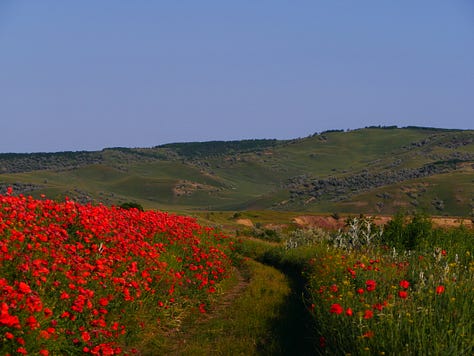

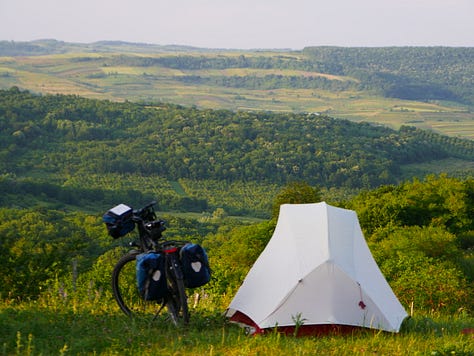
But in the Moldovan countryside, I also discovered an open-air museum which bears witness to the tormented history of this small country at the crossroads of worlds. Throughout its villages, the eternal Soviet flame still burns. Just as in Svetlana Alexievich’s novels, the main memorials of the soviet historiography stand: the one commemorating the Great Patriotic War (1941-1945), the memorial to the heroes of the Afghan War (1979-1989), and - a Moldovan particularity - the Nistru War memorial (1990-1992). Reminiscences of this past can also be seen in ruins of kolkhozes farms1 lying in the fields, or in the constructivist style of the mosaics that lighten-up the bus stops bordering the roads. I'm a big fan of them and stop for long minutes to take photos of them from every angle.

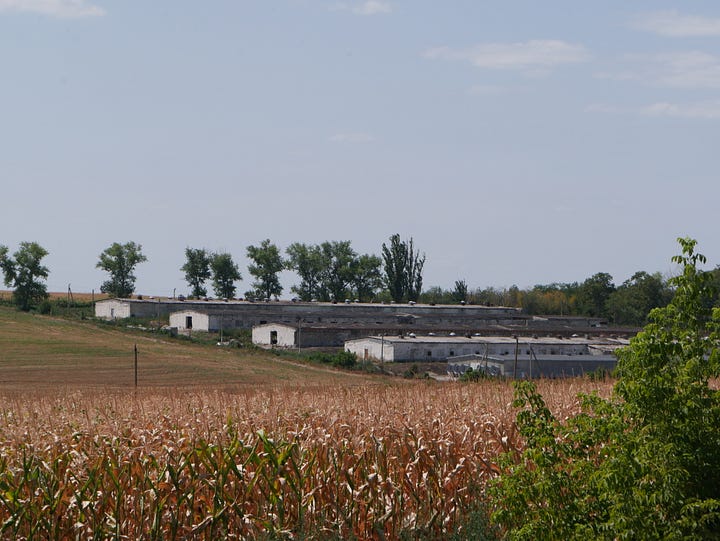

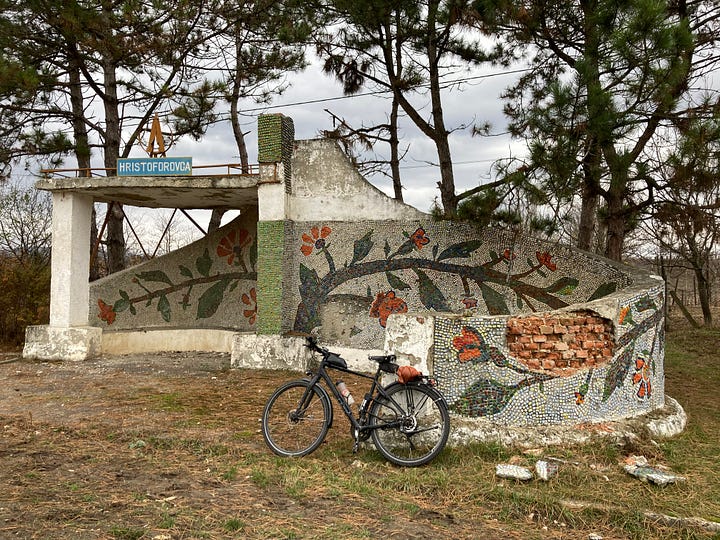
But to reduce Moldovan history and culture to this Soviet past would be unfair and would neglect the very important cultural ties that bind Moldova and Romania across the river Prut. In all the villages the streets bear the names of Mihai Eminescu, Veronica Micle, Stefan Cel Mare and Vasile Alecsandri - political leaders or authors who embody the belonging of Moldova to the Romanian cultural space. Names that also conjure up the magnificent Romanian language. A language that, admittedly, I hadn't mastered when I met Ion, but which I also learnt on the Moldovan roads, on my bike. First, by practicing my pronunciation with the street signs I came across, and then by taking my courage by the horns to try, not without mistakes, to speak Romanian in the alimentaras2 where I came to refuel with calories. I liked to think that the strange looks people sometimes gave me came from my unusual clothing rather than from my strong French accent – a lie to myself.
I have to say that my learning of Romanian, which was recently rewarded by a B2 certificate, was an essential part of my experience in Moldova. When I arrived in the country I chose Romanian classes over Russian classes. A choice that has been questioned by my friends - often foreigners - but which I do not regret. Indeed, not only has it enabled me to communicate with more people, but it has also allowed me to develop special relationships with them because of the appreciation shown towards the fact that I had learnt the official language of Moldova, Romanian. Linguistic questions are highly politicized in Moldova, and being constantly sent back to the post-Soviet space and the Russian language can be very frustrating for a part of the population who see their country's future within the European Union.
But Moldova is much more than all these political considerations. Far from the geopolitics that teach us of a Moldova torn apart by countless political, linguistic, and ethnic dividing lines, my pedals blended all these different influences to reveal a deliciously warm, hospitable and infinitely culturally rich country. Far from the gloomy, grey images of Moldova that we see in the West, on my bike I discovered a Moldova full of comforting colors, enchanting smells, sounds that bring rhythm to the landscapes, and flavors that made me fall in love with the country. The electric colors of traditional houses. The taste of the strawberries offered to me by the pickers as I cycled past them. The music of folk bands playing for local holidays. The scent of lavender, which in addition to coloring the landscape, perfumes it. The stunned looks of the passengers as their marshutka3 overtakes my bike on this rural road. The sound of traditional music pouring out of this house whose inhabitants are working in the garden. Me, my bike and I went off the beaten track - literally - to discover a different Moldova, one that you can't help but fall in love with.
“Kolkhoz” is the name for the collective farms in the former Soviet Union
An “alimentara” is a small shop. They can range in size from a couple of square meters to a village general store.
“Marshutka” is a hard word to translate to English. Technically it’s a “maxi-taxi” in British English though it has no equivalent in America. Basically, a marshutka is a Dodge Sprinter or similar van with around 15 seats (though actual capacity seems to be limitless). They act as the main transport artery for towns too small to warrant a full sized bus. Adding to the cultural mix is the fact that marshutka is a Russian word. In Romanian it would be rutiera, though marshutka is more common in most parts of Moldova.




As a returned Peace Corps Volunteer that lived in Criuleni and Slobozia-Dusca, this is a familiar story. I love to hear this type of hospitality still exists in Moldova. Even if I have never actually met Ion (although your picture of him looks familiar), I know I have met the kindness and curiosity of Moldovans like him, and the interactions meant the world to me.
Great article! My daughter is living in northern Moldova and it was enjoyable to see more of the country through your words. In the town she’s in, the stray dogs are cared for by the neighbors and as such are friendly. But she doesn’t have a bike, so those dogs might very well chase a biker too. So glad you found a way to bike safely.